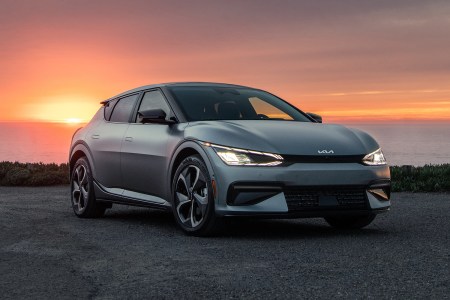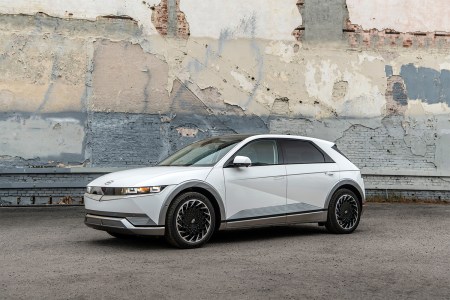A key component of the success of Genesis as an upstart luxury brand is its ability to thoroughly separate itself from parent company Hyundai. Primarily, this has been achieved through the pursuit of next-level driving dynamics (on par or in some cases surpassing its European competition), class-leading interior design and striking styling, all of which serve to obscure the occasional pilfering of parts from the Korean conglomerate’s greater empire.
What makes the 2023 Genesis GV60 such an outlier isn’t necessarily that it’s the first fully-electric addition to the automaker’s lineup, but rather that a big part of what makes it so compelling is a direct lift from a pair of previously-established EVs wearing less prestigious badges. The GV60 rides on Hyundai’s E-GMP platform, which is the same battery architecture used by the Hyundai Ioniq 5 and the Kia EV6. As a result, not only does the Genesis find itself competing against other premium electrics at its price point, but also its own siblings stickering for significantly less.
It’s a situation Genesis is well aware of, and the company has positioned the GV60 to succeed on both fronts by concentrating on the same characteristics that have served it so well in its gas-powered options. Whether that’s enough to convince you that the GV60’s elevated price tag is worth the extra squeeze depends entirely on what you expect out of an electric vehicle.

More, But Not the Most Juice
It’s hard to say enough good things about E-GMP. Although this acronym (Electric Global Modular Platform) is largely opaque to the average EV shopper, it’s the reason why vehicles like the Hyundai Ioniq 5 are capable of blazing fast charge times, and the source of the Kia EV6’s equally scorching acceleration.
The Genesis GV60 carries over everything there is to like about the platform, which means its 77.4-kWh battery can suck down electrons at speeds of up to 235 kW, placing it at the front of the pack when it comes to cutting DC fast-charging times short. It also boasts up to 248 miles of range in its longest-legged Advanced trim, with the Performance model I drove cutting that only slightly to 235 miles. Even in the dead of winter with temperatures plunging well below freezing, I saw only a 20% drop-off in estimated driving range, which is impressive for any electric vehicle.
Review: Kia Goes After a New Crowd With the Upscale EV6
A little less curb appeal means more range for the new electric SUVThe GV60 Performance’s dual-motor setup is also of note thanks to its 429 horsepower and 446 lb-ft of torque, numbers that represent a more than 100-pony jump over the entry-level model. If that’s not enough for you, then tapping the Boost button on the steering wheel gives you 10 seconds in heaven by way of an extra 54 horsepower and 70 lb-ft of twist, a kick in the pants that’s solid enough to knock the GV60’s 0-60 mph time down below 3.8 seconds.
The all-wheel-drive GV60 is truly terrific in a straight line, and the Boost function is more than just a PlayStation-esque power-up: it ups accelerator sensitivity to the point that you’ll want to make sure you only twitch that right-hand thumb once you’re fully committed to the bit. Of course, the practical utility of a Fast and Furious-style digital nitrous injection is limited to the occasional passenger scare or stoplight grand prix session, but even without Boost mode engaged the Genesis remains resoundingly satisfying to drive with the pedal down.
Strangely, however, the GV60 Performance doesn’t represent the most potent formulation of E-GMP’s charms. For 2023, Kia has added the GT edition of the EV6 to the mix, which bursts onto the scene with 576 horsepower and 545 lb-ft of torque spinning out from the same power pack, entirely Boost-button-free. Whether this is done to position Kia as the hi-po standard-bearer of this EV triumvirate is unclear, but it does require the GV60 to leverage more than just sheer numbers to justify the Performance trim’s nearly $70,000 price tag (roughly $8,000 more than the EV6 GT’s ask).

Devil, Meet Details
Clearly, the Genesis interior design team was briefed on just such a need. Unlike so many of its electrified (and, indeed, internal combustion) rivals, the GV60 turns away from the vast expanses of glossy plastic that have transformed automotive interiors into piano-black wastelands. Instead, the small crossover relies on quilted upholstery, elegant door and dashboard leather, and chic stitching to add detail instead of flat, dust-accumulating sameness. Genesis’s standard chrome switchgear is abundant, providing a strong complement of hard controls working alongside more finicky touch sensors and screens. Holding it all down is what might loosely be termed a “power orb” that sits on the center console, an enchantingly-illuminated crystalline entity that rotates on start-up to reveal the vehicle’s shift dial.
That small bit of theatricality isn’t the only party trick that the GV60 has up its sleeve. To enter the cabin, owners have the potential to mug for the camera that stores their face-print and does away with the need for a key. This might feel like yet another high-tech gimmick until one considers the needs of older drivers, who now make up a sizable percentage of new car shoppers. Eliminating the requirement for arthritic fingers to fumble with a fob is a boon that may be worth shipping off your biometric information to a remote server room whirring in the ether of the automotive cloud.
Review: The Hyundai Ioniq 5 Slices EV Charging Times, Peels Back Eyeballs
The best-looking Hyundai in the showroom just happens to be electric.The same-concept fingerprint ignition setup on the inside, however, feels more like a step in the opposite direction (and is particularly useless when wearing gloves in the wintertime). I also couldn’t get the self-parking feature (which allows the vehicle to roll forward and backwards using the key fob) to work at all, despite having no issues when testing it on other models from the brand.
In addition to its stunning interior, the Genesis GV60 makes a statement with its sheet metal, leaning harder into the hunched hatchback look than either of its Kia or Hyundai cousins, and presenting a more graceful profile than some of the chunkier electrified choices like the (more expensive) Jaguar I-Pace and the (less expensive) Audi Q4 E-tron. Its occasionally complicated looks won’t be for everyone, but even non-EV enthusiasts routinely commented on the GV60’s appearance, as the vehicle makes a clear statement despite its modest footprint.

The Best Problem to Have
Seen exclusively in the context of other electric luxury crossovers of similar size, the Genesis GV60 is an appealing option. Style and grace, power and pace, and a not unreasonable starting price (just under $60,000 for the base model) work in the vehicle’s favor, and even if you save some cash by opting for the less-gifted drivetrain, the GV60’s healthy range, excellent interior and lightning-quick charging speeds are still on the table.
As compared to its in-house competition, the GV60 is a bit of a harder sell. Both the Ioniq 5 and the EV6 boast decent cabins of their own, and their interior space and overall utility are of course quite comparable given their shared ancestry. The savings involved in moving down the prestige ladder are formidable (approaching $20,000 for some trim levels), and for some buyers the same (or better) driving experience for less money could tilt a purchase decision away from the Genesis showroom.
Hyundai is thus faced with a terrible burden: three flavors of excellent, and practical, EV SUV, each staking out its own distinct styling territory at a variety of respectable price points. If only every other automaker were facing such a conundrum, perhaps the electric car revolution would be advancing at a much brisker pace.
This article was featured in the InsideHook newsletter. Sign up now.























